牛津译林版九年级英语上册Unit8 Detective stories Period3 Grammar课件(共56张PPT)
文档属性
| 名称 | 牛津译林版九年级英语上册Unit8 Detective stories Period3 Grammar课件(共56张PPT) |
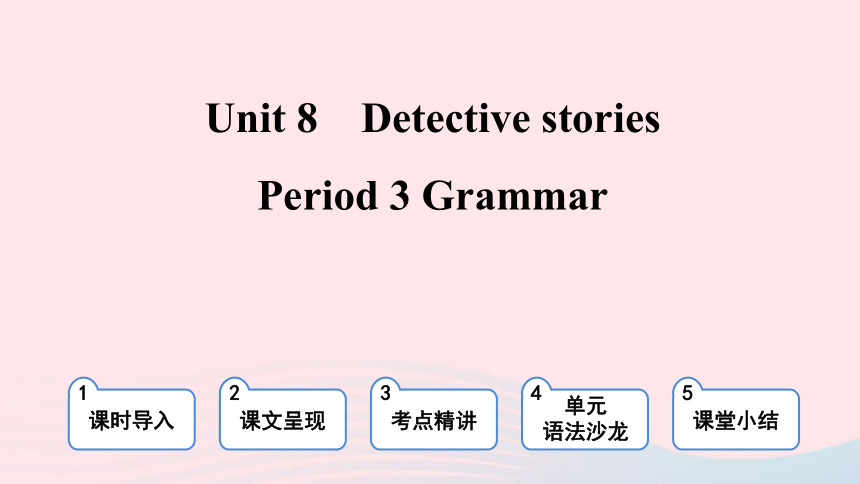
|
|
| 格式 | pptx | ||
| 文件大小 | 3.0MB | ||
| 资源类型 | 教案 | ||
| 版本资源 | 牛津译林版 | ||
| 科目 | 英语 | ||
| 更新时间 | 2025-02-06 00:00:00 | ||
图片预览

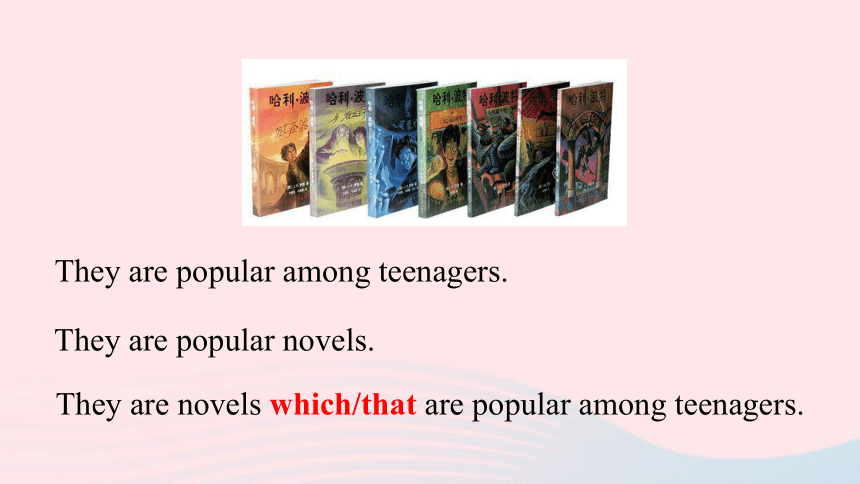


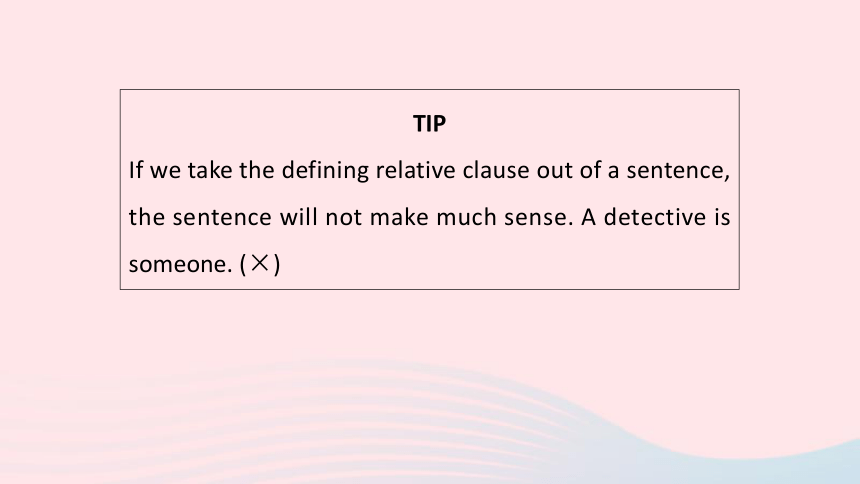

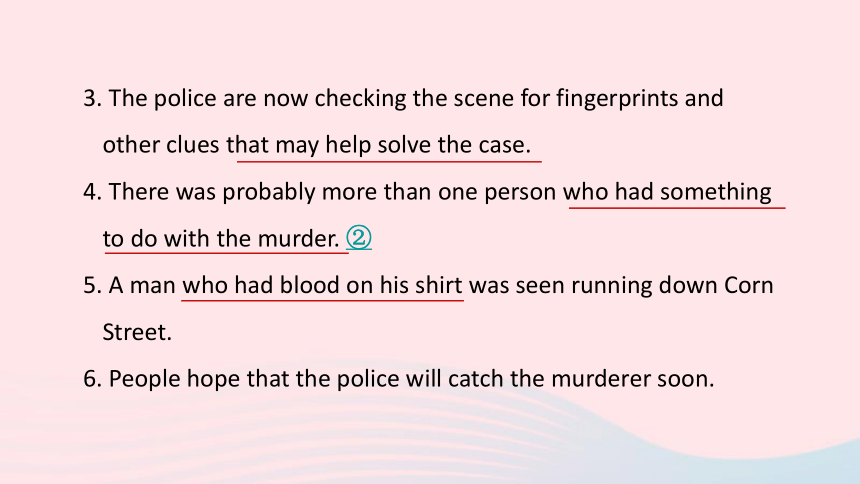

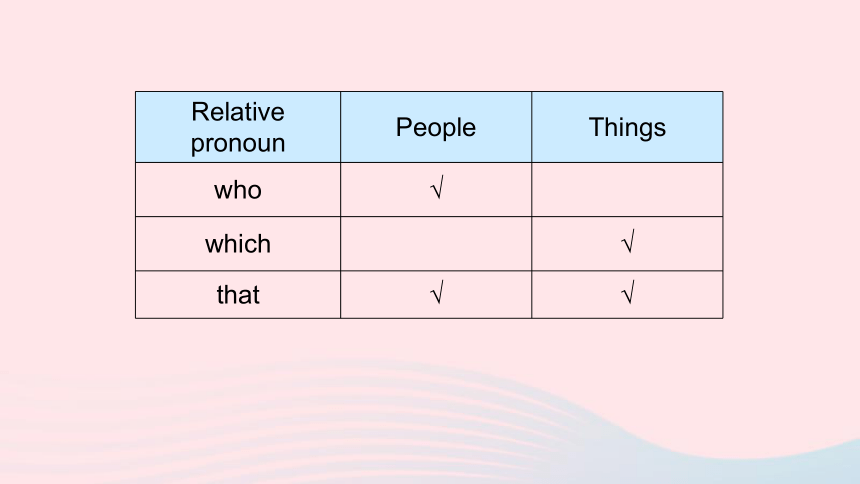

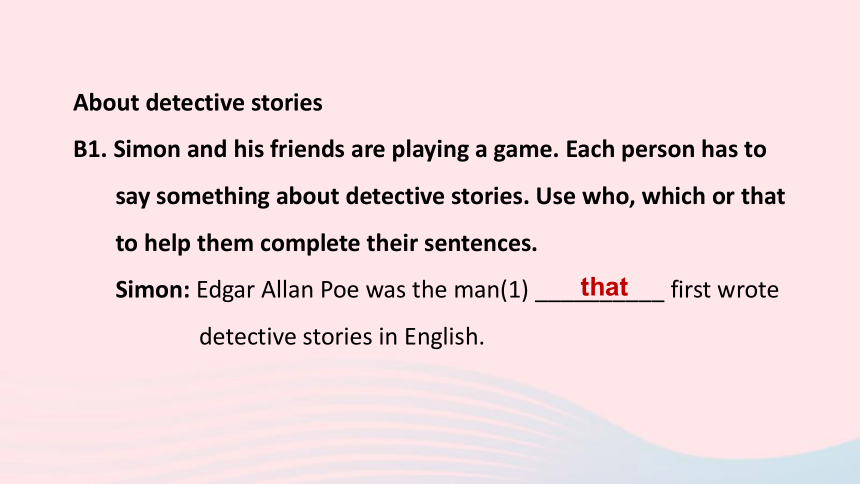

文档简介
(共56张PPT)
Unit 8 Detective stories
Period 3 Grammar
1
课时导入
2
课文呈现
3
考点精讲
4
单元
语法沙龙
5
课堂小结
They are popular among teenagers.
They are popular novels.
They are novels which/that are popular among teenagers.
Grammar
A. Defining relative clauses
We use adjectives to describe someone or something.
a short thin man useful information
But when we need a sentence to describe someone or something, we use a relative clause.
A detective is someone who looks for clues to something important.
A defining relative clause describes the noun before it. We cannot take it out of a sentence because it contains important information. We can use who, which or that in defining relative clauses.
We are asking anyone who saw anything unusual near Corn Street last night to contact us.
We are now checking the scene for more clues which will help solve the case.
The victim’s parents have offered a reward of 50, 000 for any information that leads to the arrest of the murderer.
TIP
If we take the defining relative clause out of a sentence, the sentence will not make much sense. A detective is someone. (×)
More about the murder
Millie is writing down some sentences about the murder case. Help her decide whether they contain defining relative clauses. Underline the defining relative clauses.
1. The young man mentioned that he was going to visit his parents after work.
2. The elderly couple were very sad to hear that their only son was murdered. ①
3. The police are now checking the scene for fingerprints and other clues that may help solve the case.
4. There was probably more than one person who had something to do with the murder. ②
5. A man who had blood on his shirt was seen running down Corn Street.
6. People hope that the police will catch the murderer soon.
B. Relative pronouns
Who, which and that can be used as relative pronouns. We use them to refer to people and/or things.
TIP
That and which refer to things. That is more usual than which.
Relative pronoun People Things
who √
which √
that √ √
We use relative pronouns to introduce relative clauses. The relative clause comes after the noun it refers to.
So far, the only suspect is a short thin man who was seen running down Corn Street at 10 p.m. last night.
Anyone who can provide useful information should contact the police.
We are now checking the scene for more clues which will help solve the case.
About detective stories
B1. Simon and his friends are playing a game. Each person has to say something about detective stories. Use who, which or that to help them complete their sentences.
Simon: Edgar Allan Poe was the man(1) __________ first wrote detective stories in English.
that
Millie: Japanese writers have written some great stories(2) __________ require readers to check every tiny detail for possible clues to the criminal cases.
Daniel: Sherlock Holmes is a character (3) __________ was created by Arthur Conan Doyle as a master at solving crimes.
Suzy: Conan is a detective (4) __________ appears in a cartoon series popular among teenagers all over the world.
Kitty: Agatha Christie was a female writer (5) __________ is considered the queen of crime novels.
which
who
who
who
Solving the crimes
B2. A reporter is interviewing a police officer on TV about the murder in West Town. Millie is taking notes. Help her complete the sentences using relative clauses.
1. A young man was murdered yesterday. He was single.
2. A knife was found in a rubbish bin near Corn Street. It was covered in blood.
3. We need information. It’ll help solve the case.
4. Here’s the drawing of the person. He might be the murderer of the young man.
1. A young man ____________________ was murdered yesterday.
2. A knife _________________________________ was found in a rubbish bin near Corn Street.
3. We need information ____________________________________.
4. Here is the drawing of the person __________________________
______________________________________________________.
who was single
which was covered in blood
that will help solve the case
that might be the murderer
of the young man
B3. A few days later, Millie is telling her dad about the plete their conversation with who, which or that and the expressions in the box.
is not allowed by the law
his boss had committed
killed the young man
was seen running down the street
Dad: Has there been any progress in the West Town murder case, Millie
Millie: Yes. The person(1) ______________________ was his boss!
Dad: Really Why did he do it
Millie: The boss did something(2) __________________________. The victim wanted to report the crime (3) ______________ ____________________ to the police.
who killed the young man
that is not allowed by the law
which his boss
had committed
Dad: How terrible! What about the man(4) _____________________________________
Millie: Well, it turned out that he had nothing to do with this case. ③ He works in a meat market and the blood on his shirt was from killing hens and ducks. He was in a hurry to catch a bus! ④
who was seen running down the street
couple /'k pl/ n. (尤指) 夫妻;一对
couple 作可数名词时, 指两人, 尤其是夫妇。The couple 作主语, 强调整体时, 视为单数;强调个体时, 视为复数。
e.g. The couple was/ were married in 1976.
这对夫妇于1976 年结婚。
考点1
考向1
知识点
1
The elderly couple were very sad to hear that their
only son was murdered.
couple 作名词, 表示“两人;两件事物;几个人”。a couple of 意为“一对, 一双;几个”, 相当于a few。
e.g. I saw a couple of men get out.
我看见有两个男人出去了。
We went there a couple of years ago.
我们几年前去过那里。
考向2
考题1:The old __________(夫妇) made their living by selling vegetables.
couple
返回
温馨提示:可返回原文
probably /'pr b bli/ adv. 大概, 或许
e.g. He can probably tell us all the details we want.
他也许能告诉我们想要的全部详情。
Probably he might be cured.
也许他被治好了。
考点2
知识点
2
There was probably more than one person who had
something to do with the murder.
probably 作副词常用于肯定句中,位于助动词、情态动词或连系动词之后,实义动词之前。有时还可以放在句首。
考题2:CITIC Tower in Beijing is ____________ (可能, 大概) one of the tallest buildings in the whole world.
probably
返回
(高频) turn out 原来是, 结果是
turn out 表示“结果是”, 往往有较强的出人意料之意。
e.g. The film turned out to be a great success.
这部影片结果大获成功。
That man turned out to be a thief.
那个人原来是个贼。
考点3
考向
知识点
3
Well, it turned out that he had nothing to do with this case.
turn out 还可意为“关掉(灯或热源);熄灭,”相当于turn off。
与turn 相关的短语还有
① turn on 打开
② turn off 关闭
③ turn up 调大(音量等)
④ turn down 调小(音量等)
⑤ turn over 翻转
⑥ turn into 变成
考题3:Through the reform, the economic situation of China _______ to be better than it used to be.
A. turns into B. turns off
C. turns to D. turns out
【点拨】本题用短语辨析法。句意:通过改革, 结果是中国的经济形势比过去好了很多。turn into 变成;turn off关掉;turn to 转向;turn out 结果是。由句意可知选D。
D
返回
in a hurry 急忙, 赶快
in a hurry 在句中可用作状语或表语, 注意其中必须有冠词。
e.g. She dressed in a hurry.
她匆忙穿好衣服。
Sorry, I haven’t got time to do it now—I’m in a hurry.
对不起, 我现在没时间管这个—我忙着呢。
考点4
考向
作状语
作表语
知识点
4
He was in a hurry to catch a bus!
in a hurry 的常用搭配
① in a hurry to do sth.
急于去做某事
② in no hurry/not in any hurry (to do sth.)
不着急做某事
拓展:hurry 可作动词, 表示“匆忙到某处去”, 之后只需接表示地点的副词或介词短语即可, 习惯上不接 go, come, move 等表示运动方向类的动词。
e.g. He hurried home/to school. 他匆忙回家/ 去学校。
Hurry up. 快点儿。
He told us to hurry (up) .
他叫我们快点儿。
在肯定句中可以与副词up连用。
hurry作动词的常用搭配
① hurry to do sth.急忙做某事
② hurry up 快点儿,赶快
考题4:[天水改编] We left in such a ________ that we forgot our tickets.
A. hurry B. fear C. safety D. silence
考题5:[黄石] 快点, 否则我们上课要迟到的。
________ ________, ________ we will be ________ for class.
A
Hurry up or late
返回
限制性定语从句和关系词
限制性定语从句和关系代词 概述 在复合句中, 修饰某一名词或代词的从句叫定语从句。被修饰的名词或代词叫先行词, 定语从句一般放在先行词的后面。限制性定语从句紧跟先行词, 主句与从句不用逗号分开, 从句不可省去。①
限制性定语从句和关系代词 关系代词(在先行词及定语从句之间, 起连接作用) that: 既可用于指人, 也可用于指物。在从句中作主语或宾语, 作主语时不可省略, 作宾语时可省略。②
which: 用于指物, 在从句中作主语或宾语, 作主语时不可省略, 作宾语时可省略。③
who/ whom: 用于指人, who 用作主语, whom 用作宾语。在口语中, whom 有时可用who 代替, 也可省略。④
whose: 表示的是所属关系, 可以用于指人和物, 不可省略。⑤
关 系 副 词 when 指时间, 其先行词表示时间, 在从句中作时间状语。⑥
where 指地点, 其先行词表示地点, 在从句中作地点状语。⑦
why 指原因, 其先行词表示原因, 在从句中作原因状语。⑧
e.g. He is the man who I saw yesterday.
他就是我昨天见过的那个人。
The building which stands near the train station is a supermarket.
位于火车站附近的那座大楼是一家超市。
考点1
返回
e.g. I like music that I can sing with.
我喜欢我能跟着一起唱的音乐。
考点2
考题1:[邵阳] —What kind of music do you like, Linda
—I like music _______ I can dance to.
A. when B. that C. what
B
【点拨】本题用语法判定法。空格前面的先行词music 是事物, 关系代词用that, 故选B。
返回
e.g. Abing’s Erquan Yingyue is a piece which all the great erhu masters play and praise.
阿炳的《二泉映月》是所有二胡大师们都演奏和赞颂的一首作品。
考点3
考题2:[乐山] —What kind of books do you like best
—I like books _______ are about science and technology.
A. who B. whom C. which
【点拨】本题用语法判定法。句意:—你最喜欢哪种书?—我喜欢关于科技的书。先行词是books, 指物, 关系代词使用that 或which。
C
返回
e.g. She likes musicians who can play different kinds of music.
她喜欢能演奏不同种类音乐的音乐家。
考点4
考题3:[营口] He _______ does not reach the Great Wall is not a true man.
A. whom B. / C. which D. who
【点拨】句意:不到长城非好汉。考查定语从句。题干包含定语从句。先行词是“He”, 空处在从句中作主语。whom 作宾语, 指代人;which 作主语或宾语, 指代物;who 作主语或宾语, 指代人。关系代词在定语从句中作主语时不能省略。故选D。
D
返回
e.g. The desk whose legs are broken belongs to me.
这个坏了腿的桌子是我的。
考点5
考题4:[铜仁] —Do you know the boy ______ handwriting won the first in the competition
—Oh, he is Wang Wei, our monitor.
A. who B. whose
C. whom D. which
【点拨】先行词是the boy, 空处在从句中作定语, 故选关系代词whose。
B
拓展:(1) 当定语从句中含有介词, 介词放在句末时, who, that, which 可省略, 但介词在关系代词前面时, 只能用“介词+ which/whom”结构。
(2) 在含有介词的固定短语中, 介词不可前置, 只能放在原来的位置上。
(3) that 作介词的宾语时, 介词不能放它的前面, 只能放在从句中动词的后面。
(4) 关系代词只能用that 的情况:
① 当先行词被序数词或形容词最高级修饰, 或本身是序数词或形容词最高级时, 只能用that, 而不用which。
② 当先行词为all, much, everything, anything, none 等不定代词时, 只能用that, 而不用which。
③ 当先行词被the only, the very, the last 等修饰时, 只能用that, 而不用which。
④ 先行词既指人又指物时, 只能用 that, 而不用which。
⑤ 以who或which 引导的特殊疑问句, 为避免重复, 只能用that。
(5) 关系代词只能用which, 而不用that 的情况:
① 先行词为that 时, 用which 而不用that。
② 关系词前有介词时, 一般用which, 而不用that。
③ 引导非限制性定语从句, 用which而不用that。
考题5:Do you know the way to the company ______ your father works
A. that B. which
C. in which D. in what
C
返回
e.g. I’ll never forget the time when we worked on the farm.
我将永远不会忘记我们在农场工作的那段日子。
考点6
考题6:The film brought the hours back to me _______ I was taken good care of in that far-away village.
A. which B. who
C. when D. where
【点拨】先行词为the hours, 关系词在从句中作时间状语。which 和who是关系代词, 不能作状语, 故排除, where 是关系副词, 在从句中作地点状语, 所以排除。
C
返回
e.g. The factory where his father works is in the west of the city.
他父亲工作的那个工厂在城市的西部。
考点7
考题7:I will leave the city ______ I have lived for nearly 10 years.
A. which B. that
C. when D. where
D
返回
e.g. This is the reason why he came late.
这就是他来晚的原因。
考点8
考题8:Could you tell me the reason _________ you were late for school (填入定语从句的关系词)
why
返回
本节课主要学习了:
重点单词:hurry , probably , couple , boss
重点短语:turn out, have nothing to do with, in a hurry
Unit 8 Detective stories
Period 3 Grammar
1
课时导入
2
课文呈现
3
考点精讲
4
单元
语法沙龙
5
课堂小结
They are popular among teenagers.
They are popular novels.
They are novels which/that are popular among teenagers.
Grammar
A. Defining relative clauses
We use adjectives to describe someone or something.
a short thin man useful information
But when we need a sentence to describe someone or something, we use a relative clause.
A detective is someone who looks for clues to something important.
A defining relative clause describes the noun before it. We cannot take it out of a sentence because it contains important information. We can use who, which or that in defining relative clauses.
We are asking anyone who saw anything unusual near Corn Street last night to contact us.
We are now checking the scene for more clues which will help solve the case.
The victim’s parents have offered a reward of 50, 000 for any information that leads to the arrest of the murderer.
TIP
If we take the defining relative clause out of a sentence, the sentence will not make much sense. A detective is someone. (×)
More about the murder
Millie is writing down some sentences about the murder case. Help her decide whether they contain defining relative clauses. Underline the defining relative clauses.
1. The young man mentioned that he was going to visit his parents after work.
2. The elderly couple were very sad to hear that their only son was murdered. ①
3. The police are now checking the scene for fingerprints and other clues that may help solve the case.
4. There was probably more than one person who had something to do with the murder. ②
5. A man who had blood on his shirt was seen running down Corn Street.
6. People hope that the police will catch the murderer soon.
B. Relative pronouns
Who, which and that can be used as relative pronouns. We use them to refer to people and/or things.
TIP
That and which refer to things. That is more usual than which.
Relative pronoun People Things
who √
which √
that √ √
We use relative pronouns to introduce relative clauses. The relative clause comes after the noun it refers to.
So far, the only suspect is a short thin man who was seen running down Corn Street at 10 p.m. last night.
Anyone who can provide useful information should contact the police.
We are now checking the scene for more clues which will help solve the case.
About detective stories
B1. Simon and his friends are playing a game. Each person has to say something about detective stories. Use who, which or that to help them complete their sentences.
Simon: Edgar Allan Poe was the man(1) __________ first wrote detective stories in English.
that
Millie: Japanese writers have written some great stories(2) __________ require readers to check every tiny detail for possible clues to the criminal cases.
Daniel: Sherlock Holmes is a character (3) __________ was created by Arthur Conan Doyle as a master at solving crimes.
Suzy: Conan is a detective (4) __________ appears in a cartoon series popular among teenagers all over the world.
Kitty: Agatha Christie was a female writer (5) __________ is considered the queen of crime novels.
which
who
who
who
Solving the crimes
B2. A reporter is interviewing a police officer on TV about the murder in West Town. Millie is taking notes. Help her complete the sentences using relative clauses.
1. A young man was murdered yesterday. He was single.
2. A knife was found in a rubbish bin near Corn Street. It was covered in blood.
3. We need information. It’ll help solve the case.
4. Here’s the drawing of the person. He might be the murderer of the young man.
1. A young man ____________________ was murdered yesterday.
2. A knife _________________________________ was found in a rubbish bin near Corn Street.
3. We need information ____________________________________.
4. Here is the drawing of the person __________________________
______________________________________________________.
who was single
which was covered in blood
that will help solve the case
that might be the murderer
of the young man
B3. A few days later, Millie is telling her dad about the plete their conversation with who, which or that and the expressions in the box.
is not allowed by the law
his boss had committed
killed the young man
was seen running down the street
Dad: Has there been any progress in the West Town murder case, Millie
Millie: Yes. The person(1) ______________________ was his boss!
Dad: Really Why did he do it
Millie: The boss did something(2) __________________________. The victim wanted to report the crime (3) ______________ ____________________ to the police.
who killed the young man
that is not allowed by the law
which his boss
had committed
Dad: How terrible! What about the man(4) _____________________________________
Millie: Well, it turned out that he had nothing to do with this case. ③ He works in a meat market and the blood on his shirt was from killing hens and ducks. He was in a hurry to catch a bus! ④
who was seen running down the street
couple /'k pl/ n. (尤指) 夫妻;一对
couple 作可数名词时, 指两人, 尤其是夫妇。The couple 作主语, 强调整体时, 视为单数;强调个体时, 视为复数。
e.g. The couple was/ were married in 1976.
这对夫妇于1976 年结婚。
考点1
考向1
知识点
1
The elderly couple were very sad to hear that their
only son was murdered.
couple 作名词, 表示“两人;两件事物;几个人”。a couple of 意为“一对, 一双;几个”, 相当于a few。
e.g. I saw a couple of men get out.
我看见有两个男人出去了。
We went there a couple of years ago.
我们几年前去过那里。
考向2
考题1:The old __________(夫妇) made their living by selling vegetables.
couple
返回
温馨提示:可返回原文
probably /'pr b bli/ adv. 大概, 或许
e.g. He can probably tell us all the details we want.
他也许能告诉我们想要的全部详情。
Probably he might be cured.
也许他被治好了。
考点2
知识点
2
There was probably more than one person who had
something to do with the murder.
probably 作副词常用于肯定句中,位于助动词、情态动词或连系动词之后,实义动词之前。有时还可以放在句首。
考题2:CITIC Tower in Beijing is ____________ (可能, 大概) one of the tallest buildings in the whole world.
probably
返回
(高频) turn out 原来是, 结果是
turn out 表示“结果是”, 往往有较强的出人意料之意。
e.g. The film turned out to be a great success.
这部影片结果大获成功。
That man turned out to be a thief.
那个人原来是个贼。
考点3
考向
知识点
3
Well, it turned out that he had nothing to do with this case.
turn out 还可意为“关掉(灯或热源);熄灭,”相当于turn off。
与turn 相关的短语还有
① turn on 打开
② turn off 关闭
③ turn up 调大(音量等)
④ turn down 调小(音量等)
⑤ turn over 翻转
⑥ turn into 变成
考题3:Through the reform, the economic situation of China _______ to be better than it used to be.
A. turns into B. turns off
C. turns to D. turns out
【点拨】本题用短语辨析法。句意:通过改革, 结果是中国的经济形势比过去好了很多。turn into 变成;turn off关掉;turn to 转向;turn out 结果是。由句意可知选D。
D
返回
in a hurry 急忙, 赶快
in a hurry 在句中可用作状语或表语, 注意其中必须有冠词。
e.g. She dressed in a hurry.
她匆忙穿好衣服。
Sorry, I haven’t got time to do it now—I’m in a hurry.
对不起, 我现在没时间管这个—我忙着呢。
考点4
考向
作状语
作表语
知识点
4
He was in a hurry to catch a bus!
in a hurry 的常用搭配
① in a hurry to do sth.
急于去做某事
② in no hurry/not in any hurry (to do sth.)
不着急做某事
拓展:hurry 可作动词, 表示“匆忙到某处去”, 之后只需接表示地点的副词或介词短语即可, 习惯上不接 go, come, move 等表示运动方向类的动词。
e.g. He hurried home/to school. 他匆忙回家/ 去学校。
Hurry up. 快点儿。
He told us to hurry (up) .
他叫我们快点儿。
在肯定句中可以与副词up连用。
hurry作动词的常用搭配
① hurry to do sth.急忙做某事
② hurry up 快点儿,赶快
考题4:[天水改编] We left in such a ________ that we forgot our tickets.
A. hurry B. fear C. safety D. silence
考题5:[黄石] 快点, 否则我们上课要迟到的。
________ ________, ________ we will be ________ for class.
A
Hurry up or late
返回
限制性定语从句和关系词
限制性定语从句和关系代词 概述 在复合句中, 修饰某一名词或代词的从句叫定语从句。被修饰的名词或代词叫先行词, 定语从句一般放在先行词的后面。限制性定语从句紧跟先行词, 主句与从句不用逗号分开, 从句不可省去。①
限制性定语从句和关系代词 关系代词(在先行词及定语从句之间, 起连接作用) that: 既可用于指人, 也可用于指物。在从句中作主语或宾语, 作主语时不可省略, 作宾语时可省略。②
which: 用于指物, 在从句中作主语或宾语, 作主语时不可省略, 作宾语时可省略。③
who/ whom: 用于指人, who 用作主语, whom 用作宾语。在口语中, whom 有时可用who 代替, 也可省略。④
whose: 表示的是所属关系, 可以用于指人和物, 不可省略。⑤
关 系 副 词 when 指时间, 其先行词表示时间, 在从句中作时间状语。⑥
where 指地点, 其先行词表示地点, 在从句中作地点状语。⑦
why 指原因, 其先行词表示原因, 在从句中作原因状语。⑧
e.g. He is the man who I saw yesterday.
他就是我昨天见过的那个人。
The building which stands near the train station is a supermarket.
位于火车站附近的那座大楼是一家超市。
考点1
返回
e.g. I like music that I can sing with.
我喜欢我能跟着一起唱的音乐。
考点2
考题1:[邵阳] —What kind of music do you like, Linda
—I like music _______ I can dance to.
A. when B. that C. what
B
【点拨】本题用语法判定法。空格前面的先行词music 是事物, 关系代词用that, 故选B。
返回
e.g. Abing’s Erquan Yingyue is a piece which all the great erhu masters play and praise.
阿炳的《二泉映月》是所有二胡大师们都演奏和赞颂的一首作品。
考点3
考题2:[乐山] —What kind of books do you like best
—I like books _______ are about science and technology.
A. who B. whom C. which
【点拨】本题用语法判定法。句意:—你最喜欢哪种书?—我喜欢关于科技的书。先行词是books, 指物, 关系代词使用that 或which。
C
返回
e.g. She likes musicians who can play different kinds of music.
她喜欢能演奏不同种类音乐的音乐家。
考点4
考题3:[营口] He _______ does not reach the Great Wall is not a true man.
A. whom B. / C. which D. who
【点拨】句意:不到长城非好汉。考查定语从句。题干包含定语从句。先行词是“He”, 空处在从句中作主语。whom 作宾语, 指代人;which 作主语或宾语, 指代物;who 作主语或宾语, 指代人。关系代词在定语从句中作主语时不能省略。故选D。
D
返回
e.g. The desk whose legs are broken belongs to me.
这个坏了腿的桌子是我的。
考点5
考题4:[铜仁] —Do you know the boy ______ handwriting won the first in the competition
—Oh, he is Wang Wei, our monitor.
A. who B. whose
C. whom D. which
【点拨】先行词是the boy, 空处在从句中作定语, 故选关系代词whose。
B
拓展:(1) 当定语从句中含有介词, 介词放在句末时, who, that, which 可省略, 但介词在关系代词前面时, 只能用“介词+ which/whom”结构。
(2) 在含有介词的固定短语中, 介词不可前置, 只能放在原来的位置上。
(3) that 作介词的宾语时, 介词不能放它的前面, 只能放在从句中动词的后面。
(4) 关系代词只能用that 的情况:
① 当先行词被序数词或形容词最高级修饰, 或本身是序数词或形容词最高级时, 只能用that, 而不用which。
② 当先行词为all, much, everything, anything, none 等不定代词时, 只能用that, 而不用which。
③ 当先行词被the only, the very, the last 等修饰时, 只能用that, 而不用which。
④ 先行词既指人又指物时, 只能用 that, 而不用which。
⑤ 以who或which 引导的特殊疑问句, 为避免重复, 只能用that。
(5) 关系代词只能用which, 而不用that 的情况:
① 先行词为that 时, 用which 而不用that。
② 关系词前有介词时, 一般用which, 而不用that。
③ 引导非限制性定语从句, 用which而不用that。
考题5:Do you know the way to the company ______ your father works
A. that B. which
C. in which D. in what
C
返回
e.g. I’ll never forget the time when we worked on the farm.
我将永远不会忘记我们在农场工作的那段日子。
考点6
考题6:The film brought the hours back to me _______ I was taken good care of in that far-away village.
A. which B. who
C. when D. where
【点拨】先行词为the hours, 关系词在从句中作时间状语。which 和who是关系代词, 不能作状语, 故排除, where 是关系副词, 在从句中作地点状语, 所以排除。
C
返回
e.g. The factory where his father works is in the west of the city.
他父亲工作的那个工厂在城市的西部。
考点7
考题7:I will leave the city ______ I have lived for nearly 10 years.
A. which B. that
C. when D. where
D
返回
e.g. This is the reason why he came late.
这就是他来晚的原因。
考点8
考题8:Could you tell me the reason _________ you were late for school (填入定语从句的关系词)
why
返回
本节课主要学习了:
重点单词:hurry , probably , couple , boss
重点短语:turn out, have nothing to do with, in a hurry
